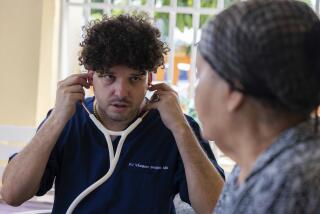Disease Leaves a Mark of Desperation
- Share via
TIJUANA — Juan Trejo says he has labored hard, perhaps to a fault, throughout his life.
“We were poor,” explained Trejo, seated on the concrete front porch of his home in a ramshackle squatter’s neighborhood. “I never liked to sit down.”
His working days are now over, and, Trejo fears, his life could be next. Once robust and energetic, he has been reduced to a gaunt, skeletal figure of less than 100 pounds who barely has the energy to breathe and is exhausted after only a few steps.
Trejo, who is 29 but looks to be in his 40s, is a modern-day victim of advanced tuberculosis.
TB, for decades the dreaded, leading killer in the United States, now represents a reduced threat in the developed world, thanks to improved treatment and elevated standards of living. In Mexico and elsewhere in the Third World, however, it remains a primary illness, afflicting particularly the poor, whose resistance is reduced by poor nutrition and exposure to carriers.
Trejo, with a wife and two young children to support, has no insurance and no money for care. He worries about paying for bandages to cover a wound after recent surgery to remove a lung.
Last week, Trejo made his way to a government-run clinic in Tijuana where patients receive free care, provided through a joint program involving both the Mexican government and the San Ysidro Health Center, a nonprofit clinic in the border community of San Diego. It is a singular example of U.S.-Mexican cooperation along the border.
Trejo, adept with his hands, moved with his family to Tijuana at a young age and learned to fix cars and do construction work. At the age of 15, he was found to have tuberculosis. He abandoned treatment when he felt better, a not unusual scenario among the poor, who are under great pressure to work.
“If I only knew. . .” Trejo said as he rested on his porch, an exhausted smile on his haggard face. He was surrounded by junked motors and half-finished projects--a new fence, a garden, an adjoining house for a brother--that he will never complete.
His latest relapse occurred in March, the worst ever. Trejo entered General Hospital in Tijuana, which is notorious for its shortage of basic supplies, such as bandages, X-ray film and plaster. He went untreated for several days, he said, until he decided to leave and seek help in the United States. He believed he would die otherwise.
Operation to Remove Lung
Using a false visa, he snuck into the United States and eventually wound up at UC San Diego Medical Center, where he was operated on, had a lung removed and received medication during a four-month stay.
He was finally released last week, rejoining his family in Tijuana. (The family wanted to remain with an aunt in National City, Trejo said, but the stigma against TB is still great, and he was not welcomed with open arms.) His wife, Estela, was captured by U.S. immigration authorities, along with the couple’s two children, while crossing the border to visit him in the hospital.
Now, admittedly desperate, Trejo knows he cannot work again. But, he reasons, if he survives he can care for the children--Juan Jr., 5, and Norma Patricia, 3--while his wife finds a job cleaning houses.
“What kept me alive are my two children,” Trejo said, cradling the children in his arms.
“It’s important that I be with them. They need someone to guide them.”
More to Read
Sign up for Essential California
The most important California stories and recommendations in your inbox every morning.
You may occasionally receive promotional content from the Los Angeles Times.













